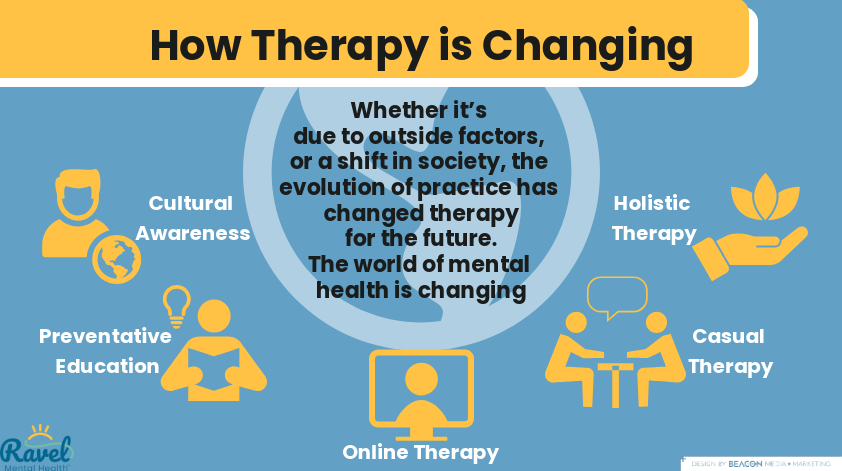Much like everything, therapy has evolved over the years. It’s become more curated towards helping your clients in a way that works for them.
That can range from using technological advances to the way we address mental health in society. The changes over the last few years have expanded what therapy can do for people.
So, how is therapy different today? Shifting to modern psychotherapy can help treat more people with available resources and treatments that work for them. These advances allow therapists to treat their clients in effective ways that will continue to change psychotherapy.
Are you interested in helping more people? Sign up for Ravel Mental Health today to connect with new clients!
Why is Psychotherapy Changing?
As researchers make more breakthroughs in understanding how the brain works, the method for helping people does too. People were institutionalized and possibly medicated when it wasn’t understood, even if that shouldn’t have been the solution.
Now, educated professionals can better understand diseases and disorders within the brain and how they can affect someone. With this knowledge, you can understand what someone may be living through and learn how to treat them.
We’ve also begun to recognize that everyone is different, meaning the treatment methods vary from client to client. Creating different solutions for treating clients is necessary when other conventional methods don’t work.
The evolution of modern psychotherapy makes it easier for people to understand what is going on, how that affects them, and how it can be treated. It also makes therapy more approachable for people when they know many options can help them heal in a curated way. Modern psychotherapy means that people are learning, and there are new ways to treat people that best suit them.
How is Therapy Different Today?

Although therapists practice differently, some trends have changed how psychotherapy is done. Whether it’s due to outside factors, or a shift in society, the evolution has changed therapy for the future. The following are a few ways that therapy is different today.
Online Therapy
The pandemic has drastically changed the method of therapy that people can receive. Online therapy doesn’t work for some people because they need in-person interaction. There is no conclusive data suggesting whether in-person therapy versus online therapy works better.
It can be attributed to the comfort level of an individual client. Some clients may like online therapy more because it allows them to be comfortable within their homes and sometimes be more flexible with their schedules.
There are also various online therapy styles, such as hybrid counseling, texting platforms, video calls, and more. The versatility can be an appeal to many.
Therapists are affected by this demand for hybrid counseling and may require some to do all in-person counseling or offer online-only services. However, this option can be beneficial to some therapists who want to practice out of the comfort of their own home office. It can help some people save money while not dealing with location costs.
It also cuts back on transportation time that can be used for client work instead. The change in how therapy is delivered, no matter your preference, allows more people to connect with therapists.
Cultural Awareness
As society has changed, there is a better understanding of how someone’s cultural background affects them daily. It can affect the way they see the world and maintain relationships.
Many therapists are now moving towards culturally sensitive therapy that allows people to address how the culture they were raised in has affected them. It also means that when there are events involving that person’s race or ethnicity, it may affect them.
BIPOC clients need therapists that can understand how their background has framed how they interact with the world. Although there is a giant lack of BIPOC therapists, many clients seek therapists similar to them, so there is a deeper understanding.
If you don’t share the same social or economic background as your client, you should address those differences and see if that affects how you create treatment plans or conversate with them.
Culturally sensitive therapy means addressing your client’s background and how that might play a factor in the person’s life. It can help you provide better care for your clients by incorporating this into your practice.
Are you interested in connecting with BIPOC clients? Sign up for Ravel Mental Health today!
Holistic Therapy
Holistic therapy is a new approach that aligns with holistic medicine. It’s a way of looking at a person’s overall lifestyle and how that affects them.
Practicing holistic therapy includes looking at your client’s food, exercise, and physical factors that impact their mental health. Sometimes it isn’t mental disorders such as anxiety, depression, or PTSD that affect someone’s mental health.
You can help your patient find the path to better mental stability when looking at their habits and how they live their life. If their mental health is suffering because of controllable factors within their physical life, you can help them recognize the impact of these habits on their life and help curate a plan to change.
Many people like holistic therapy since it doesn’t require the use of prescription medications to help balance their mental health. They don’t have to worry about the possible side effects of medications and can focus on what factors they can change in their life.
Preventative Education
Over the last few years, many people have seen how impactful mental health is on someone. It’s become more widely accepted to be open about problems that someone might be going through. Some may participate in preventative education about mental health to support this acceptance.
This means that people are willing to educate others about mental health and how to recognize the signs that someone’s mental health is suffering. People who learn about common mental health issues can help someone in need if they recognize the symptoms. There is a possibility that people can help someone who is struggling and considering suicide.
Preventative education is there to help stop a crisis from happening. It can also allow someone to feel comfortable seeking help when they need it.
If schools, communities, and parents can help children learn about mental health, they may be more likely to seek help before the issue becomes harder to treat. Almost half of all mental health conditions begin by 14 and 75% by age 24.
With a large number of children facing mental health conditions, preventative education can help them receive needed care when they know they might need help.
Casual Therapy
A trend that has come around with online therapy is casual therapy. Some therapists are moving away from professional counseling.
Clients may feel more comfortable opening up to you if you approach their care casually. It can make it feel more like talking to a friend rather than someone that is there to “diagnose their problems.”
Casual therapy can benefit some as it’s an approachable way of receiving therapy. It doesn’t seem intimidating, and they may be more open to talking with you about anything that is bothering them.
When your client is comfortable, they will feel like it’s easier to talk about anything, even the hard stuff. You can practice casual therapy by dressing casually or relaxing in a comfortable chair. Casual therapy is another tool for helping clients in a way that suits them best.
How is Client-Therapist Mismatch Being Changed?
Although the practices are the most significant changes in modern psychotherapy, how you connect with your patients is another major change. Some tools allow you and your client to be better matched and will enable you to spend more time on the client rather than building the foundation of a trustworthy relationship.
Ravel Mental Health is an online platform that allows clients to book appointments with you easily. They can access your availability calendar and schedule a time to meet when it works best. It will help them find a therapist that treats what they need in a manner that best suits them. Booking clients has never been easier.
Are you ready to match with the right client? Sign up for Ravel Mental Health today to get matched!
